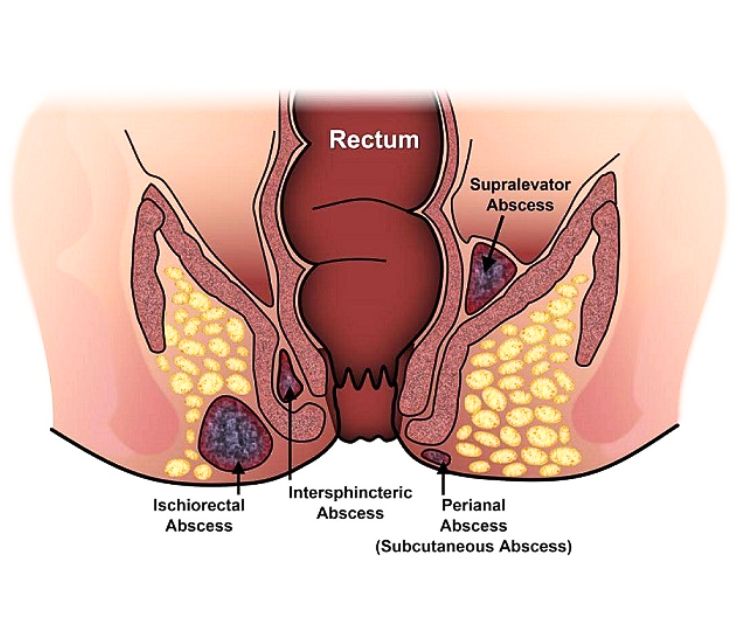Fistula Treatment in Hyderabad

WHAT IS FISTULA?
Fistula in ano, often referred to as an anal fistula, is a medical condition characterized by an abnormal tunnel-like tract that forms between the inside of the anal canal or rectum and the skin around the anus. It is typically a complication of an anal abscess.
Here’s how it generally develops:
Anal Abscess: An anal abscess is a localized collection of pus that forms in the tissues around the anus or rectum. Abscesses usually occur due to bacterial infection, often resulting from an obstructed anal gland.
Rupture: If an anal abscess is not adequately treated or drains spontaneously, it may rupture through the skin around the anus, forming a small opening called a fistula.
- Formation of Fistula: Over time, the fistula may grow and develop into a tract with two openings. One opening connects the inside of the anal canal or rectum, and the other opens onto the skin around the anus. This tunnel-like tract can become lined with epithelial tissue.
SYMPTOMS OF FISTULA
In majority of cases piles are not serious and go away on their own after a few days. An individual suffering from piles experience below symptoms:
- Itchiness around the anus
- Lump on the anus
- Loss of appetite
- Pain and discomfort while defecating
- The area around the anus may be red and sore
- Mucus discharge when emptying the bowels
- Face turns yellowish due to extensive bleeding
- After going to the toilet, a feeling that the bowels are still full
- Bright red blood after a bowel movement
- Slimy Mucus discharge when emptying the bowels
- Area around the anus may be red and sore
- Soiled undergarments
- Swelling protruding from the anus
- Frequent urge to pass stools
- Yellowish face, due to extensive bleeding
- Heaviness at anus opening
PREVENTION OF FISTULA
Fistulas can occur in various parts of the body, but the most common types are obstetric fistulas and gastrointestinal fistulas. Here are some preventive measures for each type:
Prevention of Obstetric Fistulas:
Obstetric fistulas are often caused by prolonged and obstructed labor during childbirth. To prevent obstetric fistulas, the following measures are crucial:
- Access to Adequate Maternal Healthcare: Ensure that pregnant women have access to quality antenatal care, skilled birth attendants, and appropriate medical facilities during childbirth. This includes access to emergency obstetric care in case of complications.
- Timely Cesarean Section: In cases of obstructed labor or other complications, timely cesarean section delivery can prevent fistula formation.
- Promote Family Planning: Family planning and access to contraceptive methods can help prevent unintended pregnancies, which may be associated with higher risks of complications during childbirth.
- Addressing Malnutrition: Proper nutrition and healthcare during pregnancy can help ensure that women have the strength to cope with the physical demands of labor.
- Raise Awareness: Educate communities, healthcare providers, and pregnant women about the risks and consequences of obstetric fistulas to promote early detection and timely medical intervention.
Prevention of Gastrointestinal Fistulas:
Gastrointestinal fistulas can result from various causes, including surgery, inflammation, and trauma. Preventive measures include:
- Surgical Skill and Technique: During surgeries, especially those involving the gastrointestinal system, skilled surgical techniques and careful handling of tissues can reduce the risk of fistula formation.
- Infection Control: Proper infection prevention measures in hospitals can help reduce the risk of fistulas caused by infection.
- Management of Underlying Conditions: Treat inflammatory bowel diseases, Crohn’s disease, and other conditions that may increase the risk of gastrointestinal fistulas.
- Avoidance of Unnecessary Surgery: Whenever possible, non-surgical treatments should be considered before resorting to surgery, as surgery itself can be a risk factor for fistula formation.
- Lifestyle and Diet: Maintaining a healthy lifestyle, including a balanced diet and regular exercise, can contribute to overall digestive health and reduce the risk of gastrointestinal issues.
It’s essential to remember that not all fistulas can be prevented, especially those caused by congenital conditions or unavoidable complications. In such cases, early detection and appropriate medical management are crucial to prevent further complications and improve the quality of life for affected individuals. If you suspect any symptoms of a fistula or have concerns, it’s essential to seek medical advice promptly.
LASER FISTULA TREATMENT
Laser fistula treatment refers to the use of laser technology to treat fistulas. The application of lasers in medicine is known as laser therapy, and it has been used in various medical fields for different purposes, including surgery.
In the context of fistula treatment, laser therapy may be employed in specific cases to:
- Promote healing: Laser therapy can be used to stimulate cell growth and tissue repair, potentially aiding in the closure of the fistula.
- Ablate tissue: In some cases, lasers can be used to precisely remove or destroy abnormal tissue around the fistula, facilitating the healing process.
- Reduce inflammation: Laser therapy may help reduce inflammation in the affected area, potentially promoting healing and providing symptomatic relief.
- Minimize bleeding: The precision of lasers can help minimize bleeding during surgery, which is particularly important in delicate areas.
It’s important to note that the use of laser therapy for fistula treatment depends on the individual case and the physician’s expertise. Other treatment options for fistulas include conservative management, medications, and surgical procedures, such as fistulotomy or fistula repair.
Yes Clinic
Your Path to Relief and Recovery
Welcome to Yes Clinic, where compassionate care meets expert treatment for all your piles-related concerns.

